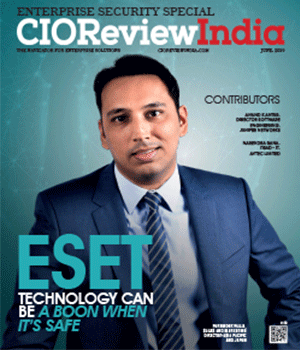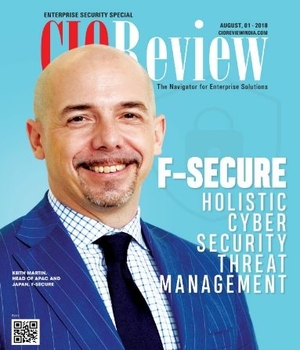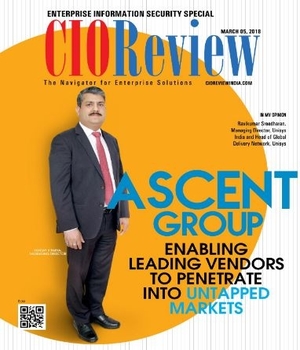
Budget Should Create an Enabling Eco-system For Technological Leap-frogging
Samir Dhir, Senior Vice President -Global Delivery Head & Head of India Operations, Virtusa Corporation
 India is on the cusp of major transformation with IT services in the forefront. As the world’s largest sourcing destination for IT, India accounted for about 67 per cent of the US $130 billion market. That the sector not only contributes to the economic well-being of Indians, but also adds substantial value overseas is what the government should look at and create an enabling environment where these companies could compete globally on a bigger scale. Appreciating the government’s thrust on IT, digitisation and technology-driven initiatives; I hope that there would be concrete incentives for start-ups and tax-sops to propel the sector to greater heights. One of India’s major drawbacks has been poor research and development (R&D) base and it is not too late for the government to help create the base and also to assist companies investing in R&D by way of fiscal and financial incentives. I believe that the R&D made substantial difference in the IT sector. Moreover, the Finance Minister should enhance budgetary allocation for the ‘Digital India’ programme as it will not only fuel economic growth but also will help bring about greater inclusiveness of the population.
India is on the cusp of major transformation with IT services in the forefront. As the world’s largest sourcing destination for IT, India accounted for about 67 per cent of the US $130 billion market. That the sector not only contributes to the economic well-being of Indians, but also adds substantial value overseas is what the government should look at and create an enabling environment where these companies could compete globally on a bigger scale. Appreciating the government’s thrust on IT, digitisation and technology-driven initiatives; I hope that there would be concrete incentives for start-ups and tax-sops to propel the sector to greater heights. One of India’s major drawbacks has been poor research and development (R&D) base and it is not too late for the government to help create the base and also to assist companies investing in R&D by way of fiscal and financial incentives. I believe that the R&D made substantial difference in the IT sector. Moreover, the Finance Minister should enhance budgetary allocation for the ‘Digital India’ programme as it will not only fuel economic growth but also will help bring about greater inclusiveness of the population.
As the government understands the importance of IT in economic growth, I expect the budget to focus on expanding the digital literacy base, improved connectivity and access to technologies. The government’s programmes such as Start-up India, Smart Cities and Skill Development will have to rely heavily on IT services as never before and it would be in the fitness of things that IT services becomes an enabler. Additionally, the Industry is keen to see how the Government is going to implement reduction in corporate tax rate to 25 percent. If effected, this move will not just attract Foreign Direct Investment but also create additional employment opportunity as well as boost the public confidence in Government in general. However, at the same time the recent proposal of CBDT to eliminate exemption (including SEZ, weighted R&D deduction)) in phased manner is little unsettling.
Keeping in mind the intention of the legislature that SEZ unit should be availing tax deduction (100 percent or 50 percent depending on the year of operation), it would be better if Government remove the levy of MAT completely. It will not only solve the immediate problem of cash flow of the SEZ unit but also address the problem of MAT credit utilization – which normally becomes a cause of litigation (i.e. eligibility, quantum, whether surcharge and cess can be taken credit of etc.) during the course of assessment. Similarly, a speedy disposal of appeal would be highly appreciated as taxpayers face a situation where tax disputes have been accumulated over a period of years and litigation is prolonged resulting in an increase in cost and unnecessary hassle at the taxpayer’s end. Along the same line, corporate spend towards Corporate Social Responsibility (“CSR”) should be tax deductible to encourage companies to do it voluntarily.
CIO Viewpoint
Why Foolproof Facial Recognition Is Key Against...
By Joseph Sudheer Thumma, Global CEO & MD, Magellanic Cloud
National Technology Day 2025: Powering Progress...
By CIOTech Outlook Team
Aligning IT Roadmap with Business Objectives: A...
By Subhash singh Punjabi, CISO & Head Enterprise Architecture, Deepak Fertilisers & Petrochemicals Corporation Ltd
CXO Insights
The Path To Managing Data As An Asset
By Lenin Gali, VP, Data Engineering, Quotient Technology
The Benefits Of Cloud Email Security
By Murali URS, Country Manager - India, Barracuda Networks
Is Secure Access Service Edge(SASE) Part Of...














